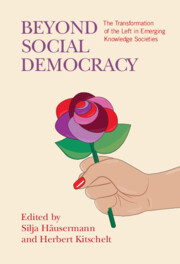Book contents
- Beyond Social Democracy
- Beyond Social Democracy
- Copyright page
- Dedication
- Contents
- Figures
- Tables
- Contributors
- Acknowledgments
- 1 Introduction and Theoretical Framework
- Part I Voter Flows and Electoral Potentials
- Part II Considerations of Choice
- Part III Determinants of Electoral Outcomes for Social Democratic Parties and the Left
- References
- Index
- References
References
Published online by Cambridge University Press: aN Invalid Date NaN
- Beyond Social Democracy
- Beyond Social Democracy
- Copyright page
- Dedication
- Contents
- Figures
- Tables
- Contributors
- Acknowledgments
- 1 Introduction and Theoretical Framework
- Part I Voter Flows and Electoral Potentials
- Part II Considerations of Choice
- Part III Determinants of Electoral Outcomes for Social Democratic Parties and the Left
- References
- Index
- References
Summary
- Type
- Chapter
- Information
- Beyond Social DemocracyThe Transformation of the Left in Emerging Knowledge Societies, pp. 423 - 457Publisher: Cambridge University PressPrint publication year: 2024
- Creative Commons
- This content is Open Access and distributed under the terms of the Creative Commons Attribution licence CC-BY-NC 4.0 https://creativecommons.org/cclicenses/



